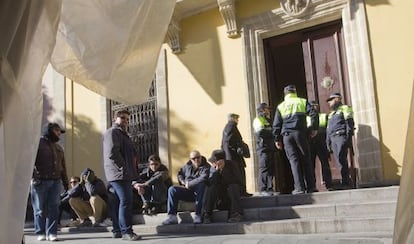Jerez, a town on the border of bankruptcy
Public workers have not been paid for months, threatening to sink the home of sherry wine

The mailbox is a cold economic indicator. You know things are not going well when the notices and returned bills start piling up. You also know things are bad when your daughter starts having problems at school because she thinks her parents are breaking up. Francisco Marcos has not been sleeping at home lately, but it’s not because he’s mad at his wife, as his daughter believes. He is one of 14 employees at the municipal cemetery in Jerez de la Frontera who have spent several nights camping out at the doors of the graveyard. They are demanding that the local government pay them the two months’ wages they are owed.
Undertakers have not received their paychecks since December, but then again neither have local police officers, clerical workers or janitors employed by the city. As a matter of fact, nobody in the 2,400-strong public workforce has been paid.
If you are the local economy chief, you know your town has reached rock bottom when you start the year without a single euro in the money box.
“Liquidity for the year 2012 is zero. There is no money for paychecks or for basic services,” admits Enrique Espinosa of the Popular Party (PP), which runs Andalusia’s fifth-largest city (population 212,629) and a place world-famous for sherry wine, flamenco, its motor racing circuit and pure-blooded horses.
Amparo Llamas is another case study in this story of municipal bankruptcy. She is one of 400 employees of Acasa, a company that is paid by the city to provide home assistance to people in need. Acasa has not been paid for the last two months, either, which means that neither have its workers.
It is 7.45am on an unusually cold morning for Jerez, but Amparo Llamas and 50 Acasa co-workers will not budge from the door of the local social welfare department. They have managed to stop the 60 department workers from entering the premises. There are protests in Jerez almost on a daily basis.
Meanwhile, local buses are on strike and only half the long-distance fleet still covers its routes to the outlying towns because the company says there is no more money for fuel. The sports arena has been closed for a year for lack of electricity, and a third of the city’s lamp-posts are out because the maintenance company says there is no money to replace stolen copper cables. “This is a lawless town,” declares José Manuel Trillo, local secretary general for the CCOO labor union.
Back at City Hall, the 60 employees of the social welfare department wait outside while their bosses decide what to do about the protest. José María is one of those inside, and he says he understands the protestors’ predicament. The city owes him wages, too. The modern building that houses this department was inaugurated just a year ago, but there is no electricity because the energy company, Endesa, refuses to provide it unless the arrears gets paid. “We are working with gasoline generators,” admits José María. “Half the building has no heating,” adds a colleague.
Acasa’s workers should be getting paid, since their services are covered by the regional government of Andalusia, and the latter has been keeping up with its payments. So the money actually enters the local coffers, but then gets lost in the yawning gap of Jerez’s other economic needs, used to cover other costs considered more urgent by local authorities. At the end of 2010, Jerez had a hole in its accounts of 958.7 million euros (663 million owed by the council and the rest by municipal corporations). “And our budget is 222 million euros,” notes Espinosa, the economy chief.
A breakdown of the city council’s debt shows that it owes 162 million euros to the banks, according to an audit commissioned by the PP when the Socialists were in power between 2006 and 2010. But the bulk of it — 461 million euros — is money owed to companies that provide local services. People who work for these contractors have the right to have their contracts transferred to any new company that may take over. What this means, in essence, is that many workers are not only owed wages by their current employers, but also by their former ones. Francisco Javier Pazos, a bus driver, is owed three monthly paychecks by the current contractor, Urbanos Amarillos. But until November 2010, the transportation concessioner was Cojetursa, which owes him a further 4,600 euros. “I am living on the money I borrow from family and friends,” says Pazos at the door of City Hall, where he is participating in a bus driver protest.
Jerez’s problems got worse with the crisis, but they were not created by the crisis. Back in 2005, when Spain was riding a boom-time wave, the city approved a restructuring plan in an attempt to bring down its debt levels, then estimated at 300 million euros. So where does this situation stem from? “It is the result of spending more than we made for 20 years,” replies Espinosa, citing projects like the 2001 refurbishing of the Jerez racing circuit, which owes 37 million euros.
Pedro Pacheco, who was mayor for 27 years, squirms in his councilor’s seat when he is upbraided for these excesses. “Nobody was complaining when Formula 1 was here for four days and eight hotels opened up,” he notes. Pacheco was behind the multimillion-euro renovation, but he now blames the ruling PP for deliberately doing nothing to stem the crisis. “They have orders not to do anything until April [the month of regional elections].”
But Jerez is also not receiving the annual 40 million euros it should be getting from the state. That transfer has been blocked because Jerez owes 133 million to the tax agency and social security. Treasury Minister Cristóbal Montoro has promised to meet with local authorities to find a way out of the crisis. Mayor María José García Pelayo this week announced that Jerez would take back control over local tax collection, after handing those powers over to the provincial authority in 2008 as a way to pay back some of its creditors. This move will presumably allow the city to collect 6.5 million euros a month “to survive” and at least pay its own workers’ wages, said the mayor.
The undertaker Francisco Marcos and his co-workers finally decided to end their protest following the mayor’s statement. But they fear that with Spain’s new labor reforms in place, the city could start laying off employees in the coming months.
Tu suscripción se está usando en otro dispositivo
¿Quieres añadir otro usuario a tu suscripción?
Si continúas leyendo en este dispositivo, no se podrá leer en el otro.
FlechaTu suscripción se está usando en otro dispositivo y solo puedes acceder a EL PAÍS desde un dispositivo a la vez.
Si quieres compartir tu cuenta, cambia tu suscripción a la modalidad Premium, así podrás añadir otro usuario. Cada uno accederá con su propia cuenta de email, lo que os permitirá personalizar vuestra experiencia en EL PAÍS.
¿Tienes una suscripción de empresa? Accede aquí para contratar más cuentas.
En el caso de no saber quién está usando tu cuenta, te recomendamos cambiar tu contraseña aquí.
Si decides continuar compartiendo tu cuenta, este mensaje se mostrará en tu dispositivo y en el de la otra persona que está usando tu cuenta de forma indefinida, afectando a tu experiencia de lectura. Puedes consultar aquí los términos y condiciones de la suscripción digital.









































